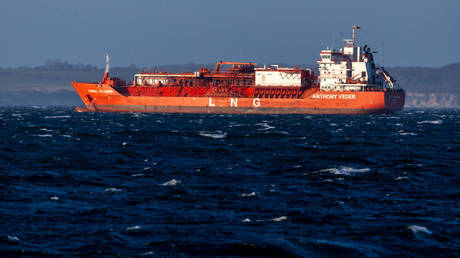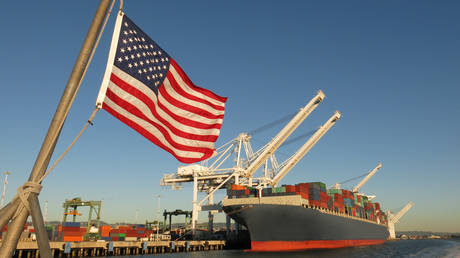ARTICLE AD BOX
France is among the top buyers of liquefied natural gas from the sanctioned country, a report has found
French imports of liquefied natural gas (LNG) from Russia more than doubled in the first half of this year, even as the EU pledges to stop consuming Russian fuel by 2027, according to analysis published by the Institute for Energy Economics and Financial Analysis (IEEFA).
According to the IEEFA’s analysis of trade data, shipments of Russian LNG to EU countries overall jumped by 7% in the first six months of the year compared to the same period last year.
Data from the non-profit, which focuses on the transition to sustainable energy, showed that French companies imported almost 4.4 billion cubic meters (bcm) of Russian LNG between January and June, compared to more than 2 bcm in the same period last year. Spain and Belgium were the next biggest buyers, with data showing a 1% and 16% decline respectively, the IEEFA said.
In June, the EU banned some operations related to LNG of Russian origin, including re-loading, ship-to-ship transfers, and ship-to-shore transfers with the purpose of re-exporting to third countries via the bloc. Russian seaborne gas imports into the EU remained permitted via LNG terminals that are linked to the interconnected natural gas network. France and Spain have the most LNG terminals in Europe.
French energy major TotalEnergies, which accounted for the bulk of the imports, told the Associated Press it was bound by contracts with Russia signed before the Ukraine conflict. The company added it will honor the agreements “as long as European governments deem Russian gas necessary for the European Union’s security of supply.”
Read more US suppliers hindering EU efforts to abandon Russian gas – Bloomberg
US suppliers hindering EU efforts to abandon Russian gas – Bloomberg
TotalEnergies owns 20% in Russia’s biggest LNG project in the Arctic Circle’s Yamal Peninsula. Under a contract signed in 2018, the French firm is committed to buying 4 million tons of gas from the joint project annually.
Commenting on the surge in Russian gas supplies, the French Finance Ministry blamed attacks by Houthi militants on vessels in the Red Sea that have forced a reshaping of LNG trade. Superchilled gas from the Middle East can no longer be easily delivered to the EU, while Russia’s LNG shipments via the Arctic route have remained unaffected, the outlet quoted the ministry as saying.
Meanwhile, data revealed that France imported significantly more LNG from Russia rather than from other suppliers, including the US, Angola, Cameroon, Egypt, and Nigeria, whereas these countries’ exports have not been affected by the Red Sea attacks.
The report also showed that while gas demand in France has dropped by 9%, French exports to Belgium have jumped by nearly 10%. With Russian LNG typically being sold at a discount, Jason Feer, global head of business intelligence at Poten and Partners, suggested that “people are making money off this trade.”
.png)
 3 months ago
2
3 months ago
2








 English (US)
English (US)